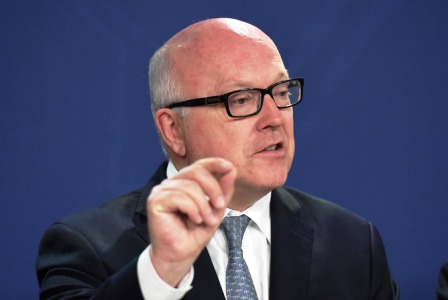Kathy Bowrey, Australian copyright reform stuck in an infinite loop, The Conversation, 18 January 2016

Attorney General George Brandis did not have a clean slate for copyright reform. Mick Tsikas/AAP
Copyright matters. It is a body of law that affects what we know, how we experience and understand the world, and what we are allowed to do with the knowledge we gain. But for most of us copyright is more of a snarl. We only know of it as a restriction that complicates how we interact with each other. It is not often experienced as regulation that helps make good new things happen.
Malcolm Turnbull’s “ideas boom”, his innovation and science agenda, is supposed to make innovation happen by spending A$1.1 billion over four years. The policy papers don’t include any mention of copyright. But copyright rules and regulations sit behind all the agendas found in the innovation statement.
So what is happening with the rules that will affect our capacity to “leap, connect, sparkle and guide” others? There is a copyright agenda underway. And in short, under Attorney-General George Brandis, there has been a lot of twitching and jerking.
Brandis did not have a clean slate. When he took his place in the Abbott ministry there was already an extensive and much needed review of copyright underway, established by the former Labor government.
Headed up by UTS Professor Jill McKeough, the Australian Law Reform Commission’s Copyright and the Digital Economy Inquiry undertook an exhaustive process to produce this final report.
Brandis sat on the final report for some time, tabling it in Parliament on February 13, 2014. The day after he gave a speech where he agreed with the problems highlighted in the report:
“The Copyright Act is overly long, unnecessarily complex, often comically outdated and all too often in its administration, pointlessly bureaucratic.”
But rather than engage with the recommendations of the report, he raised the furphy of piracy — an issue specifically excluded from the ALRC terms of reference, reserved for trade discussions conducted without public input — and then in August 2015 the Abbott government established yet another review.
The Productivity Commission inquiry into Austraia’s intellectual property system looks beyond copyright. Ostensibly there is a wide-ranging inquiry into IP laws and “incentives for innovation and investment, including freedom to build on existing innovation”.
| CAMD has participated with the GLAM sector in calling for an end to perpetual copyright in unpublished works and the reform of rules for preservation copying. For CAMD’s position see: |

